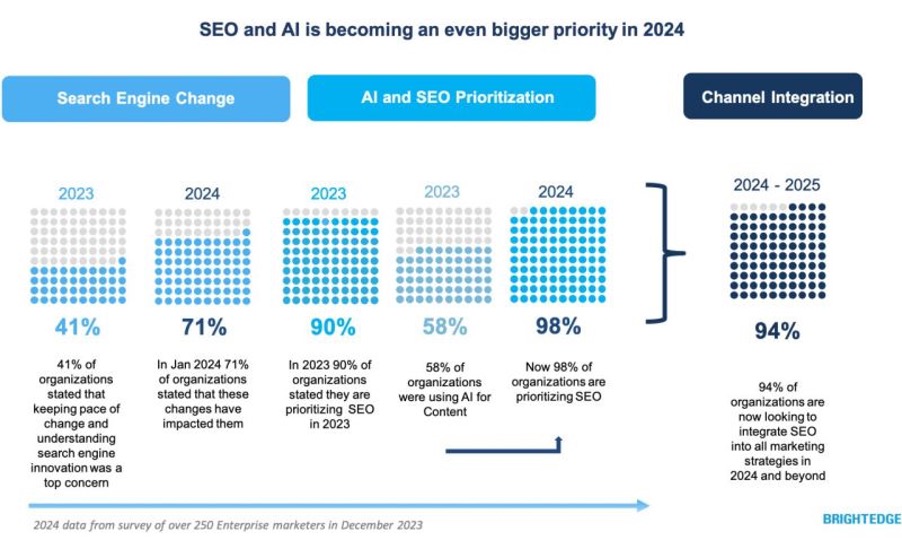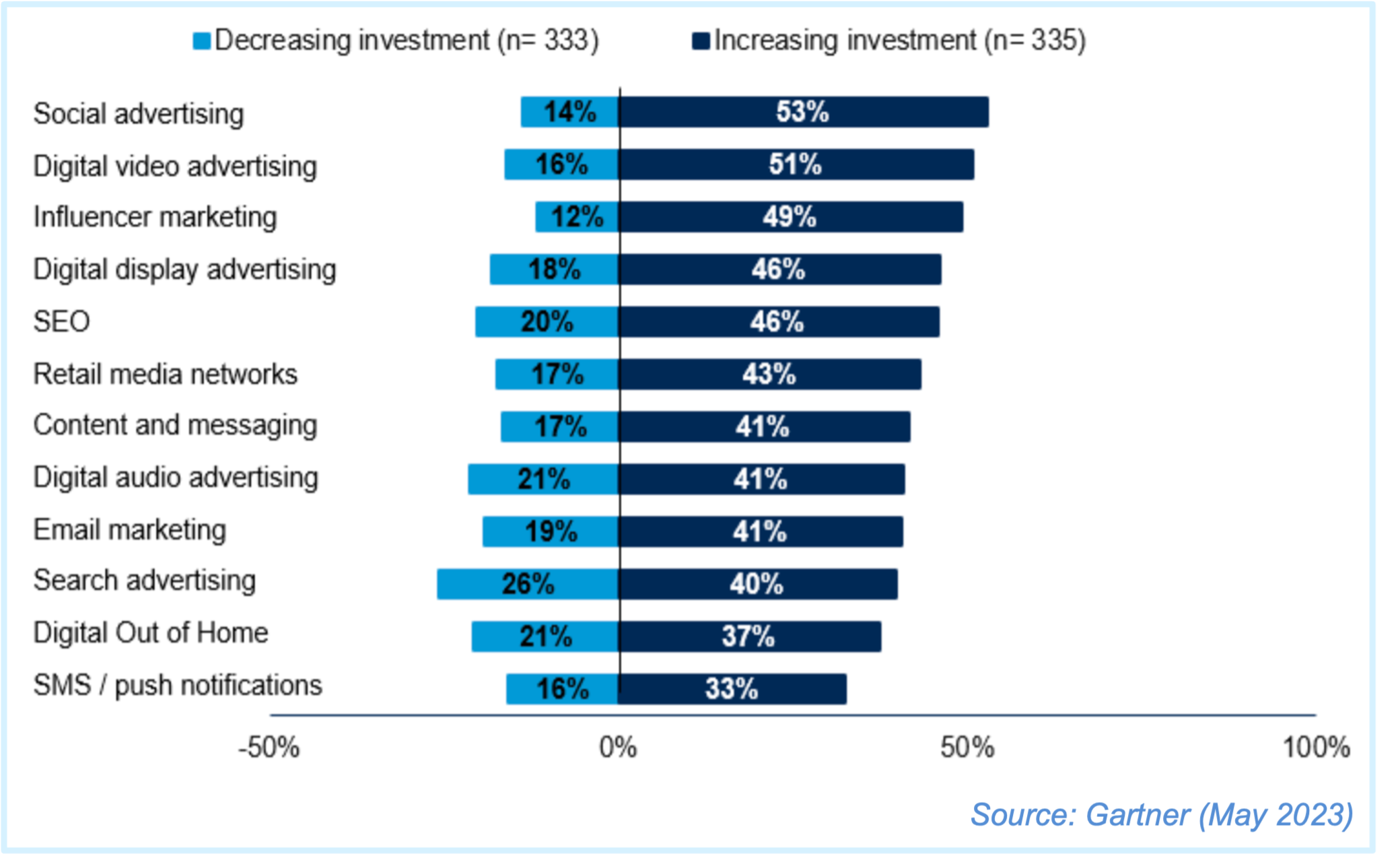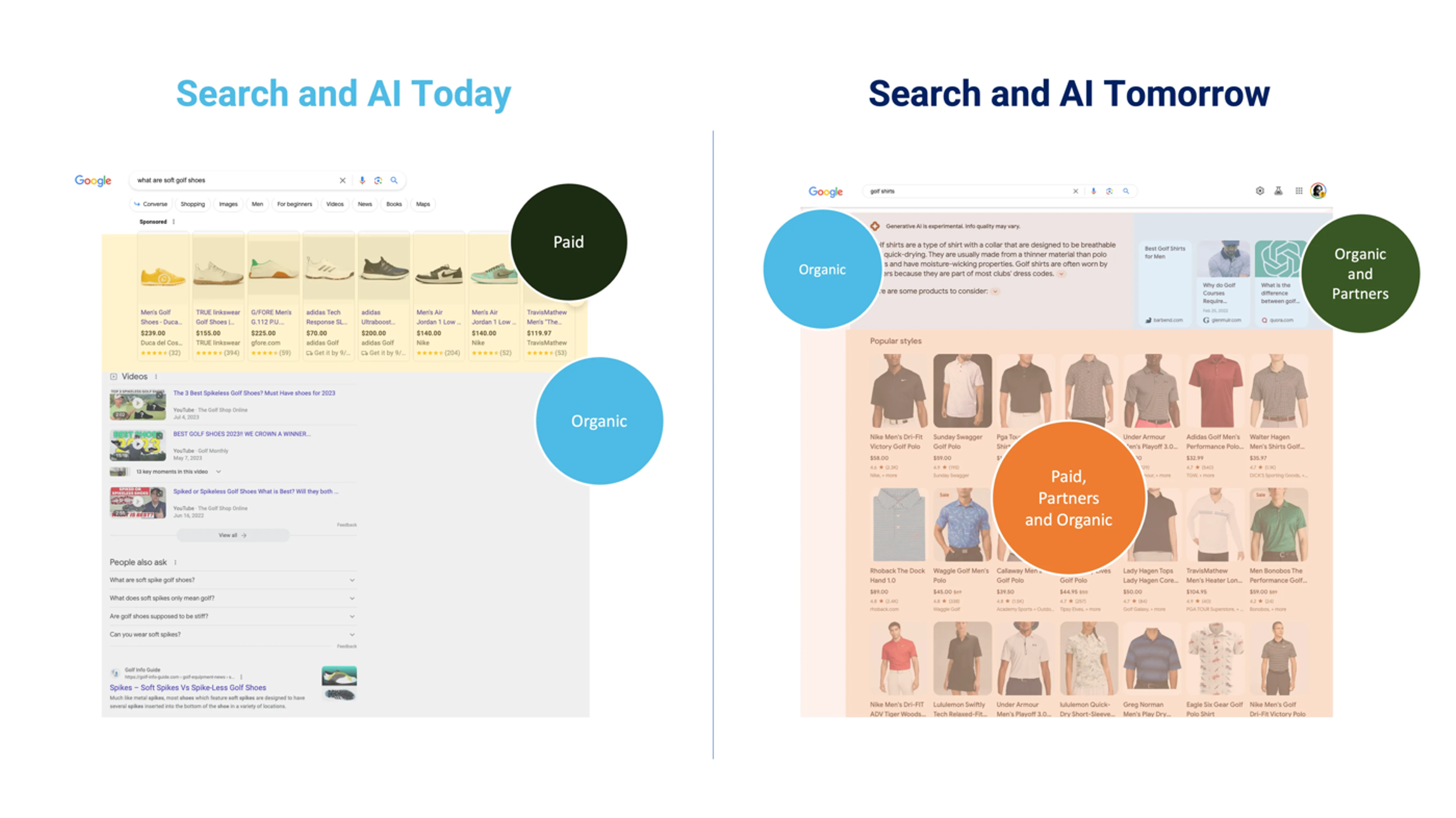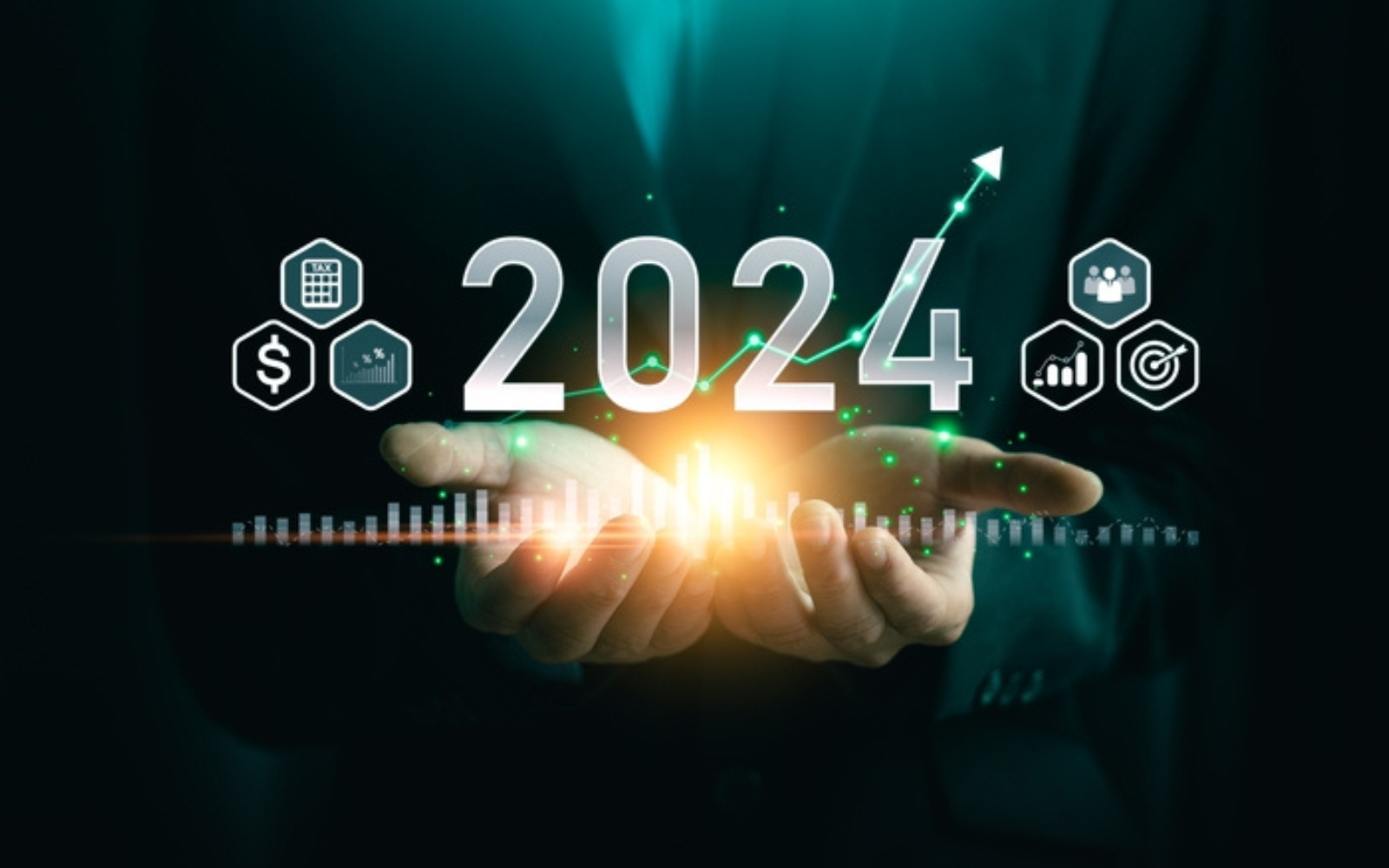SEO has undergone many transitions and disruptions in a short time.
Enterprise SEO has been at the center of some fundamental transformations over the past year.
Adapting to the ever-changing needs and demands of consumers, integrating AI into search engines, and the influx of new generative AI SEO and content tools have forced organizations to adapt and evolve their marketing strategies.
In this article, I will delve deeper into five key enterprise SEO trends for 2024 with tips to help you keep pace with change and prepare for future success accordingly.
What Is Enterprise SEO?
Enterprise SEO is typically associated with implementing SEO strategies within large-scale organizations.
It predominantly applies to sizable brands with multiple departments and complex infrastructures. This can include large – and multiple – websites that offer a diverse array of products and services.
One of the key differences between standard SEO and enterprise SEO is the need for the workflow management of stakeholders, strategic planning, and ensuring strategies align with an organization’s broader – and, in many cases, multiple – objectives.
How Enterprise SEO Has Changed
In 2024, enterprise SEO trends will be shaped by technological advancements, changing user behaviors, and the evolving search landscape.
It’s no secret that the way search engines utilize generative AI to create new user experiences is changing how enterprises look at, and understand, what is happening in the search engine results pages (SERPs).
This includes shifting from pure keyword research leveraging data-led insights to understanding conversational intent that triggers search results.
Whether you are searching via traditional results or in Google SGE labs, results now contain more sources and multiple content formats. As a result, enterprises must become more innovative and proactive in their SEO and content marketing approaches.
The great thing to see is that the role of SEO is growing and expanding in this new AI era.
 Image from author, February 2024
Image from author, February 20245 Essential Enterprise SEO Trends To Watch In 2024
1. Understanding Market Shift And Ever-Evolving Consumer Preferences
SEO is such a dynamic and intense discipline that, for the majority, it can be a ‘heads down,’ laser-focused, task-by-task approach.
However, especially when we look at enterprise SEO and large-scale projects, it is essential to take a step back and ensure you have a pulse on what is happening at a macro level.
For enterprise SEO experts, it is crucial to stay on top of the latest trends and developments in consumer behavior, especially during economic shifts. These shifts can significantly impact how businesses align their more extensive SEO and content strategies to match business objectives.
For example, the pandemic saw rapid shifts in shopping preferences for products related to staying at home.
In any era-changing economic conditions, the importance of SEO reaches an all-time high due to its cost efficiencies and compounding returns, such as branding and data-driven insights into products and all major digital strategies such as paid search, email, and social.
- Market conditions can force organizations to prioritize specific competitor strategies.
- Search algorithm updates may prioritize credibility and authoritative sources, which means content should be optimized accordingly. I will share more on this later in this article.
- Economic changes can also accelerate the use of new technologies, requiring businesses to be flexible and adaptable, and exercise caution in adoption.
Enterprise SEO pros must liaise with key management stakeholders monthly to ensure their strategies align with key business priorities to avoid going down unproductive pathways.
You must use data analytics effectively to understand target audiences and what is changing.
As enterprise SEO is a multi-stakeholder discipline, insights must be fed into organizational strategies to create more holistic, not just channel-agnostic, individualized experiences.
These can range from lead magnets that take the form of tailored marketing communications to customized product content and campaigns.
2. Using Generative AI For SEO And Content: Managing Risk Vs. Reward
According to Bloomberg Intelligence, by 2032, generative AI will be worth $1.3 trillion. Additionally, Gartner research shows that SEO and content marketing are two of the highest areas of increased investment.

Numbers vary depending on the source, but if you drill down, well over 2,000 generative content AI tools are flooding the market. No doubt you hear about a new one in the news every week!
The challenge for enterprise SEO pros who want to boost content productivity and performance lies in balancing the risk versus reward of using these tools.
Risk: Some of the content generative tools focus on velocity over quality. This is challenging for the consumer and search engines and limits the chance of your brand being discovered in a sea of nonsense.
This is because they are based on single-source, low-quality data sources that are not trained to understand your audience’s needs and wants. They have no understanding of what works in content & SEO.
For brands, this means the content can get buried below irrelevant, low-quality spam-like articles. Over time, I expect Google to solve this.
In addition, as a result, we are seeing more and more government and organization institutions building ethical AI and content creation guidelines and standards related to data use, regulation, and governance.
Always remember the risks.
- Generative AI has severe limitations and liabilities, including the tendency to “hallucinate” by fabricating information when it doesn’t have an answer.
- It can state misinformation so convincingly a reader new to the topic may believe it to be fact.
- It lacks creativity and produces output that tends to be generic and formulaic.
- The content produced is only as good as the input (prompts) and oversight (editorial process) –garbage in, garbage out.
Reward: On the flip side, if correctly used, generative AI tools can help improve content productivity and scale content for SEO campaigns.
- Help give valuable insights and inspiration: The cornerstone of successful campaign development is the strategic generation of ideas. Marketers can create compelling content by using generative AI to uncover popular search terms, monitor social media trends, and discover unique angles and ideas.
- Accelerate content production creation efficiency: Generative AI can also help segment audiences based on demographics, preferences, and behaviors, enabling you to tailor personalization strategies and unique experiences. It can also assist in timely (short-from) email marketing and crafting specific messages for each key target audience.
- Scale productivity and performance: For enterprise SEO pros who use platforms rather than multiple tools with disparate data sources, AI-generated content can be created in one platform that also helps you streamline workflows. Due to built-in privacy considerations and guardrails, platform-specific generative AI tools are likely safer to use. They can create content based on your existing assets and utilize high-fidelity and secure data based on search and content patterns. These are helpful for efficient content discovery and distribution, allowing you to focus on strategy and creation.
Recommendations from all-in-one platforms also act as a content and SEO best practice assistant.
3. Preparing For Search Generative Experiences: Your Content And Your Brand
The transition to Search Generative Experiences (SGE) marks the most substantial transformation in the history of search engines – and a seismic shift that will impact all industries, affecting every company and marketer globally.
SGE represents a paradigm shift in SEO, moving beyond traditional keyword-based tactics to embrace the power of generative AI.

As AI emerges and becomes almost a “mediator” between a company’s content and its users, one search can produce results that would have previously taken five separate searches.
Take retail shopping as an instance: AI will start to recommend a complete shopping experience that gives consumers an experience that contains many channels and sources and multiple forms of media.
For consumers, this promises deeper and more interactive experiences, leading to increased engagement and time spent on Google.
For brands, it means higher value clicks once a consumer is ready to visit your website.
I have been monitoring this (at BrightEdge) for a long time. I see experiments in critical areas that you should keep an eye on! For example:
- Testing of over 22 new content formats in SGE results.
- There are many warnings in the healthcare and YMVL industries, as Google is exercising caution.
- New visual content formats are used in industries such as e-commerce.
- More reviews are being added to results in areas like entertainment.
- There is a big focus on places (local) being integrated into results.
To help SEJ readers and the whole community, you can view for free (ungated) the data behind all these findings and a step-by-step guide to understanding this Ultimate Guide to SGE.
Note: This is still in Google Labs and has not been rolled yet. However, from the above, I firmly predict this is a matter of when, where, and how it will proceed.
4. Understanding And Adapting To New Search Behaviours: Data And Conversational Intent
Utilizing data to grasp user behavior and the underlying intent in conversations will be crucial for SEO success in both traditional and AI-driven search results.
Search is becoming conversational, and marketers must focus on user intent, advancing their understanding of their audience from simple keyword optimization to grasping conversational intent and extended phrases.
For users, this translates into more captivating and immersive experiences, leading to increased time spent on Google. This optimizes their search, guiding them swiftly to the most pertinent websites that cater to their unique needs.
For marketers, navigating your search presence becomes more intricate yet more fruitful. Anticipate reduced but higher-quality web traffic. Identifying key searches that activate various types of results is essential.
Clicks will carry greater monetary value due to enhanced conversion rates. This is because consumers are more ready to act after being informed and influenced by prior interactions and data from Google.
Marketers need to guarantee that their content strategy not only answers the specific query but also considers the broader context in which the query is made. This will help ensure targeted and effective engagement with users.
However, the core fundamentals of technical and website SEO remain the same. They will become more critical as marketers shift to optimizing their sites for higher-value traffic and clicks.
- Ensure your site is fast and responsive, it is structured, and the content is optimized for human readers. It should be structured to answer their questions in the most engaging and user-friendly way.
- Ensure your content assets are primed for conversion with clear CTAs.
Focusing on contextual signals will be vital for content marketers who want to maximize performance.
For example, schema markup, E-E-A-T, and HCU (even though not regarded as ranking factors) are vital, so search engines and users send signals so they can understand the context behind your site and content.
- Leverage data to decode user behavior and the intent behind conversations, using this insight as a catalyst for generative AI outcomes.
- Develop and refine various content types, such as videos and images, to enhance engagement.
- Coordinate marketing efforts across paid media, social platforms, and public relations to create a unified content campaign strategy.
- Concentrate on tracking metrics like traffic and converting high-quality down-funnel traffic as consumers spend more time on Google before making informed decisions and visiting your website.
And, as I know, you are now thinking. Yes, SGE could mean slightly less but more qualified traffic.
5. Managing Omnichannel Marketing: Managing SEO And Multiple Marketing Disinclines
SEO has long shifted from being a siloed channel, but enterprises must make changes now as consumers and search engine demands drive the need for even closer collaboration.
Given that the SERPs and AI-generated SGE results encompass a variety of media types and formats – including social media, reviews, and news sources – content marketers will need to get closer than ever to their SEO, digital branding, design, social media, and PR teams.
![Google search for [food delivery near me]](https://www.searchenginejournal.com/wp-content/uploads/2024/02/Multiple-Formats-SGE-brightedge-.png) Screenshot for search for [food delivery near me], Google, February 2024
Screenshot for search for [food delivery near me], Google, February 2024This is especially true as AI-powered results contain multiple formats and sources. Whether you are a big brand or not, whoever provides the best experience will win in 2024 – so expect some curveballs from your competition.
This means the relationships between people, processes, and technology must change.
Make sure you are aligning your teams and managing workflows across:
- Design – Images and video.
- Branding and PR – Messaging and company reputation.
- Content – From text to design to social.
- SEO – PPC and Website teams.
- Customer Service teams – For reviews.
- Sales teams for advice on down-funnel CTAs on your site.
For enterprise SEO pros, platforms are the only way you can do this.
Key Takeaways For Enterprise SEO Success In 2024
SEO today is going to be different than SEO tomorrow. SEO tomorrow will be different than the search in March.
 Image from author, February 2024
Image from author, February 2024Change is the core constant we all share in this industry. Time has shown us that those who keep up with trends and adapt quickly survive and thrive.
As SEO advances alongside AI, keep a core focus on monitoring consumer behavior.
Never forget many of the core principles of SEO still apply, but be ready to help your organization become more agile so your success in enterprise SEO and AI is guaranteed.
In 2024, regardless of the search source, once a consumer clicks, brands that give them the best experience win.
More resources:
- 21 SEO Experts Offer Their Predictions For 2024
- State of SEO 2024
- 5 Key Enterprise SEO Priorities CMOs Need To Get Right
Featured Image: Sutthiphong Chandaeng/Shutterstock





